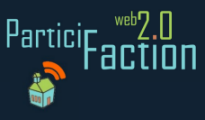I'm compiling a list of ways in which people use Facebook & Twitter in education / the classroom. Please e-mail any input to thomsonro@gmail.com
Thanks!
Ross.
Thursday, November 19, 2009
Wednesday, November 18, 2009
Blogging: Just Do It
In his blog post entitled "Just do it," Roy Tennant writes about writing. More specifically, he makes the point that the old addage of "have something to say before you start writing" may be a detrimental philosophical approach. He successfully argues two points to this effect: (1) we are all human, and thus all have something to say about the experience of being human, and (2) starting with the notion that we have to have something worthwhile to write before we start writing may well scare many into not writing at all: if our internal quality filter is on before a word hits a page, no words may ever hit the page -- insecurity may get the best of us. He suggests that people should just write: don't be sure you "have something to say," just do it. He suggests that blogging makes this easier than ever before.
He references teenage self-confidence issues in the article, reminding us of the role that high school teachers may have in the development of teen creativity and creative writing, and reminding us that blogging (and, by extension, other read/write web tools) are potentially key ways to engage these students.
Clearly, the learning of Web 2.0 skills is of benefit to the students in this way, and teachers who possess these skills -- and are willing to employ them in the classroom -- have yet another way to simultaneously foster both teen writing and teen confidence.
He references teenage self-confidence issues in the article, reminding us of the role that high school teachers may have in the development of teen creativity and creative writing, and reminding us that blogging (and, by extension, other read/write web tools) are potentially key ways to engage these students.
Clearly, the learning of Web 2.0 skills is of benefit to the students in this way, and teachers who possess these skills -- and are willing to employ them in the classroom -- have yet another way to simultaneously foster both teen writing and teen confidence.
Tuesday, November 17, 2009
Information: Only as good as the source!
Michael Ridley's short article, The Reputation Engine, reminds us that, in the growing world of "social" information sources, who you know is becoming an important gateway to what you know. He asserts that a computer-based "reputation engine" which would rate these human "sources of information" (or allow users to rate each other as sources) should be maintained -- if it were to exist -- by libraries: the already-trusted source of reliable information in society.
Reputation Engine or not, this article makes me think of two things. One: libraries can and should have a key role in the public's understanding of the importance of Web 2.0, and, Two: school libraries in particular need to emphasize student learning around effective use of Web 2.0 tools, as well as keeping students mindful of the "digital reputations" they create for themselves as they go.
Reputation Engine or not, this article makes me think of two things. One: libraries can and should have a key role in the public's understanding of the importance of Web 2.0, and, Two: school libraries in particular need to emphasize student learning around effective use of Web 2.0 tools, as well as keeping students mindful of the "digital reputations" they create for themselves as they go.
Thursday, November 5, 2009
Social Isolation and New Technology
Click here for the latest study on Social Isolation and New Technology. Turns out that tech in not killing socialization after all! Whew!
Sunday, November 1, 2009
Doctorow & Downloads
Check out Cory Doctorow's AWESOME stand on copyright, e-books, and downloading the printed works of authors! Click here and prepare to be entertained, amazed, and convinced.
Thanks to Will Richardson for the link!
Thanks to Will Richardson for the link!
Subscribe to:
Posts (Atom)




